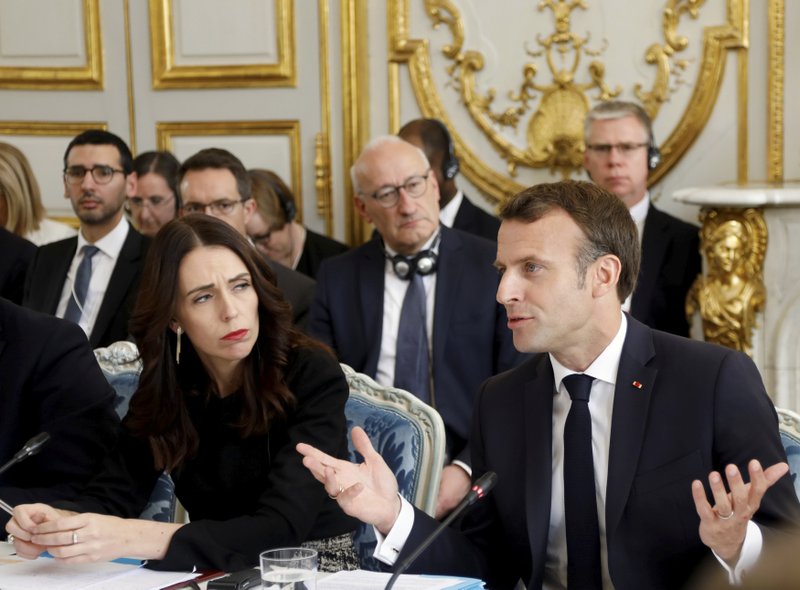PARIS -- Facebook, Google, Twitter and other tech companies joined a dozen countries in a global pledge Wednesday to step up efforts to keep Internet platforms from being used to spread hate, organize extremist groups and broadcast attacks.
World leaders led by French President Emmanuel Macron and tech executives gathered in Paris to compile a set of guidelines dubbed the "Christchurch Call," named after the New Zealand city where 51 people were killed in a March attack on mosques. Much of the attack was broadcast live on Facebook, drawing public anger and fueling debate on how to better regulate social media. Facebook said before the meeting that it was tightening rules for livestream users.
The Christchurch Call "is a global response to a tragedy that occurred on the shores of my country but was ultimately felt around the world," said New Zealand Prime Minister Jacinda Ardern, who has played a leading role pushing for globally coordinated efforts to eliminate online extremism.
"Fundamentally it ultimately commits us all to build a more humane Internet, which cannot be misused by terrorists for their hateful purposes," she said at a news conference with Macron.
The French and New Zealand governments drafted the agreement -- a road map that aims to prevent similar abuses of the Internet while insisting that any actions must preserve "the principles of a free, open and secure internet, without compromising human rights and fundamental freedoms."
The call was adopted by U.S. tech companies that also included Amazon, Microsoft and YouTube, along with France's Qwant and DailyMotion, and the Wikimedia Foundation. Countries backing France and New Zealand were Britain, Canada, Ireland, Jordan, Norway, Senegal, Indonesia and the European Union's executive body. Several other countries not present at the meeting added their endorsements.
The U.S. said it agreed with the overarching message of the Christchurch Call, but didn't want to endorse it.
In a statement, the White House said it stands "with the international community in condemning terrorist and violent extremist content online," and support the goals of the Christchurch call to action. But the White House still said it is "not currently in a position to join the endorsement."
A day earlier, as negotiations progressed, White House officials raised concerns that the document might run afoul of the First Amendment.
"We continue to be proactive in our efforts to counter terrorist content online while also continuing to respect freedom of expression and freedom of the press," the White House said Wednesday. "Further, we maintain that the best tool to defeat terrorist speech is productive speech, and thus we emphasize the importance of promoting credible, alternative narratives as the primary means by which we can defeat terrorist messaging."
The meeting in Paris comes at a pivotal moment for tech companies, which critics accuse of being too powerful and resistant to regulation. Some have called for giants like Facebook to be broken up. Europe is leading a global push for more regulation of how the companies handle user data and copyrighted material. The tech companies, meanwhile, are offering their own ideas in a bid to shape the policy response.
Unlike previous official attempts to regulate the Internet, "the Christchurch Call is different in that it associates all actors of the Internet" including the tech companies themselves, Macron said.
He said he hopes to get broader support for the agreement in coming months, with technical questions to be discussed by June.
In Wednesday's agreement, which is not legally binding, the tech companies committed to measures to prevent the spread of terrorist or violent extremist content. That may include cooperating on developing technology or expanding the use of shared digital signatures.
Amazon, Facebook, Google, Microsoft and Twitter issued a joint supporting statement, outlining in further detail actions they would take individually or together to combat abuse of technology to spread extremist content. They include making it easier for users to flag inappropriate content and publishing transparency reports on material that's removed.
Facebook said it is tightening the rules for its livestreaming service with a "one strike" policy applied to a broader range of offenses. Activity on the social network that violates its policies, such as sharing an extremist group's statement without providing context, will result in the user immediately being temporarily blocked. The most serious offenses will result in a permanent ban.
Previously, the company took down posts that breached its community standards but only blocked users after repeated offenses.
Information for this article was contributed by Angela Charlton, Masha Macpherson and Catherine Gaschka of The Associated Press; and by Tony Romm and Drew Harwell of The Washington Post.
A Section on 05/16/2019
